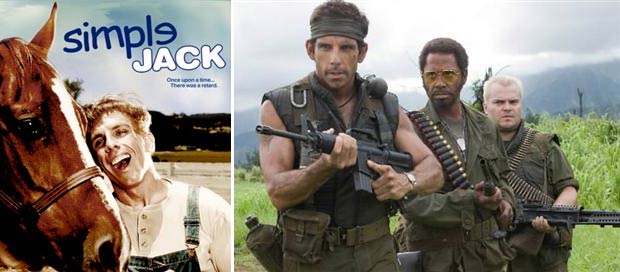
I have to admit a slightly wary interest in the upcoming Ben Stiller war/Hollywood/Tom Cruise spoof Tropic Thunder. I still get giggly over Zoolander, and Stiller’s deadpan exaggeration of Tinseltown egomania on Extras was pretty hilarious. Moreover, the buzz about Robert Downey Jr.’s edgy portrayal of an over-eager actor putting on blackface for his part has me intrigued: how will he walk that high-wire? But the biggest controversy to emerge before the film’s release turned out to be something else: its use of the term “retard.” A little context: Ben Stiller plays a bumbling action star, and part of the film’s viral marketing is a whole history for his character, including fake trailers for (hilariously terrible) earlier films. One of those was “Simple Jack,” a clear jab at Forrest Gump (and Hollywood’s other mentally challenged characters). Simple Jack’s tagline, “Once upon a time… there was a retard,” caused an uproar among disability rights groups, and DreamWorks pulled the viral web site last week. Tropic Thunder includes clips and references to “Jack,” which caused more trouble: A representative of the National Down Syndrome Congress emerged from Thunder’s Monday premier saying, “I came out feeling like I had been assaulted,” and the chairman of the Special Olympics has appeared on various media outlets assailing the “humiliation” of “good and decent human beings.”
So, here we are again: the mockery, through exaggeration, of those who evidence stereotypes is seen as feeding the actual stereotypes. On the one hand, the use of loaded terms is always troubling, but on the other hand, I’ve always found Hanks’ Gump portrayal deeply offensive in and of itself. How better to mock it than to lay bare the prejudices of those purporting to support a cause?
Now, as we recently learned thanks to the New Yorker, satire is tough, and while I’ll always go to bat for free speech and the right to mock, that cartoon’s disastrous failure at humor and troubling whiff of racial stereotyping made it offensive, no matter how many times David Remnick went on TV to plead that the New Yorker is just doing what Stephen Colbert does. You wish, Remmy. Without seeing Tropic Thunder, it’s impossible to know whether the satire succeeded, although it’s interesting that Downey Jr.’s part has caused nary a ripple of controversy. Could this whole thing just be due to Robert Downey Jr. being a much better actor than Ben Stiller?
Either way, if disability rights activists have a problem with the term “retard,” they’ve got a fight on their hands: the term is omnipresent in sitcoms and standup. Anybody ever seen Family Guy? I’m not here to defend the term; on the contrary, it gives me a twitch just to type it. But context, as always, is everything, and I think pointing out Hollywood’s proclivity for capitalizing on disabled characters is probably a good thing.











